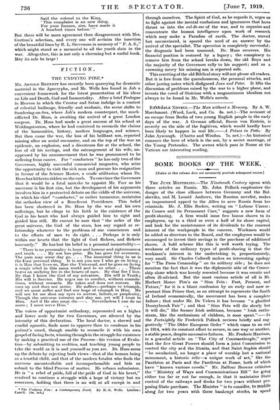FICTION.
THE UNDYING FIRE.•
MR.. ARNOLD Barnum has recently been quarrying for dramatic material in the Apocrypha, and Mr. Wells has found in Job a convenient framework for the latest presentation of his ideas on Life and Death, God and Immortality. After a brief Prologue in Heaven in which the Creator and Satan indulge in a contest of celestial badinage, friendly and sardonic, the scene shifts to Sundering-on-Sea, where Job's modern counterpart, the much. afflicted Dr. Huss, is awaiting the arrival of a great London surgeon. Dr. Huss had made a great success of his school at Woldingstanton, where he had contrived to reconcile the claims of the humanities, history, modern languages, and science. But then came the war, the loss of his brilliant son, reported missing after an aerial encounter, and on the top of the war an epidemic, an explosion, and a disastrous fire at the school, the loss of all his savings, and the estrangement of his wife, un- appeased by his announcement that he was pronounced to be suffering from cancer. For " comforters " he has only two of the Governors, highly successful commercial magnates, who seize the opportunity to visit the sick man and procure his resignation in favour of the Science Master, a crude utilitarian whom Dr. Huss has hitherto ridden on the curb. To convince the Governors that it would be a fatal mistake to appoint Mr. Farr as his successor is his first aim, but the development of his arguments involves him in a protracted debate on the riddle of the universe, in which his chief "comforter," or rather tormentor, maintains the orthodox view of a Beneficent Providence. This belief has been shattered in Dr. Huss by the war and his own sufferings, but he clings to his faith in the existence of the God in his heart who had always guided him to right and guided him still. He cannot be sure that " the order of the great universe, the God of the stars, has any regard or re- lationship whatever to the problems of our consciences and to the efforts of men to do right. . . . Perhaps it is only within our hearts that the light of God flickers, and flickers insecurely." He has lost his belief in a personal immortality :— " There is no personality in hope and honour and righteousness and truth My son has gone. He has gone for evermore. The pain may some day go. . . The immortal thing in us is the least personal thing. It is not you nor I who go on living ; it is Man that lives on, Man the Universal, and lie goes on living a tragic rebel in this same world and in no other.. . . There burns an undying fire in the bearts'of men. By that fire I live. By that I know the God of my salvation. His will is Truth ; His will is Service. He urges me to conflict, without consola- tions, without rewards. He takes and does not restore. He uses up and does not atone. He suffers—perhaps to triumph, and we must suffer and find our hope of triumph in Him. He will not let me shut my eyes to sorrow, failure, or perplexity, Though the universe torment and slay me, yet will I trust in Him. And if He also must die—. Nevertheless I can do no more ; I must serve Him."
The voices of opportunist orthodoxy, represented on a higher and lower scale by the two Governors, are silenced by the intensity of this declaration. The local doctor, a shrewd and candid agnostic, finds more to approve than to condemn in his patient's creed, though unable to reconcile it with his own gospel of facing facts, winning through in the struggle for existence by making a practical use of the Process—his version of Evolu- tion—by submitting to realities, and teaching young people to take the world as it is and yourself as you are. Dr. Huss sums up the debate by rejecting both views—that of the human being as a trustful child, and that of the modern fatalist who finds the universe uncontrollable and incomprehensible and bids us submit to the blind Process of matter. He refuses submission. He is " a rebel of pride, full of the pride of God in his heart," resolved to continue a struggle with a hope of victory but no assurance, holding that there is no will at all except in and • TO Undying Fire : a Contemporary Forel. By H. 0. Was. Loudon: Camel!. Ns. seta through ourselves. The Spirit of God, as he regards it, urges us to fight against the mental confusions and ignorances that have thrust us into the cul-de-sac.of the war, and to organize and concentrate the human intelligence upon work of research which may make a Paradise of earth. The doctor, moved but unconvinced, is 'spared the need of an answer by the arrival of the specialist. The operation is completely successful: the diagnosis had been unsound. Dr. Huss recovers. His financial position is restored by a legacy ; the conspiracy to remove him from the school breaks down, the old Boys and the majority of the Governors rally to his support; and as a crowning mercy his missing son is reported safe. This resetting of the old Biblical story will not please all readers. But it is free from the querulousness, the personal attacks, and Other jarring notes which disfigured Joan and Peter. It lifts the discussion of problems raised by the war to a higher plane, and invests the creed of Stoicism with a magnanimous idealism not always to be found in Mr. Wells's novels.


































 Previous page
Previous page